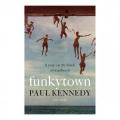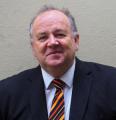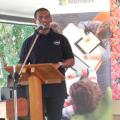Speakers Program
470 Speakers Program Items found: Showing Speakers Program Items 126 - 150
Tim Lennie
My reflection concerned the issue that is on the front of everyone’s mind these days; the war in Ukraine. Over the centuries the world has been ruled by sheer force, with invading armies conquering their neighbours and brushing aside diplomatic efforts to prevent conflict. In more recent times we have seen the human destruction created by tyrants such as Hitler and Stalin, terrorising their citizens as well as their enemies. Today the Russians are engaging in an unprovoked invasion of their peaceful neighbour, Ukraine, and shocking the civilised world. The media have covered the attack in detail so the world’s population can see the evidence as it is beamed into our homes. Our civilisation has made great progress in the last century but force still overrules international law. One wonders when we will ever learn?
Daniel Clark
GM Graduate House
Changeover Dinner
Keith Ryall

Reflections based on Keith Ryall’s perceptions of a Ben ( Mojo ) Crowe Masterclass in Personal Leadership.
He talked about 3 Key Mindsets….
- The Connection Mindset-connect with ourselves before we connect with the outside world. ( The only person I can control 100% of the time is myself.) Beware the FOOPO syndrome….the Fear of Other Person’s Opinions. Think….””I don’t care what people think about me but I do care about what I think of them.”” So let go of other people’s views….Stop Doing and Start Being….write a To Be list, as well as a To Do list. ( e.g., Be Grateful, Be Kind etc )
- Develop a Purpose Mindset-what do I want in life? The 2 most important days in your life…the day you were born and the day you find out Why! What is my Why? What is it that excites me about helping others? What do we really stand for? What will be my own personal Legacy? Move from I thinking to We; from Resume to Eulogy?
- Develop a Performance Mindset….life itself is a Performance but we get so distracted by what we can’t control. Accept that there are things we can’t control so focus on the things we can control. As Viktor Frankl wisely said in his book, Mans Search for Meaning….The last of the human freedoms is to choose one’s own reaction , regardless of circumstances.
There are many free You Tube clips of Ben Crowe’s thoughts on Personal Leadership; just do any Google Search and they should pop up. Some are called Mojospresso and are in many Episodes-most are short and punchy; e.g., Episode 13-Finding Purpose runs for 11 minutes.
Tony Broughton
REFLECTIONS ON A TRIP OVERLAND IN 1970
After over 32 months living and working in London, in September 1970. I left Earls Court in a 52 seat Sundowners bus. It was an old bus. It did not have power steering and, at Dover,we had to push-start it to get it on the ferry. This seemed to happened now and again
We were a happy group of 40 young people from Aus and NZ : 30 young women and 10 men including the 2 driver/couriers
.At 30 I was the oldest on the bus. It wasn't my first bus trip that year as I had already done two 8-week European bus camping tours for Continental Coach Tours (CCT) as a driver/courier in Ford Transit mini-buses and in the previous year I had spent 4 months going around Europe in my own van. So the London -Greece/European Turkey route wasn't new to me.
As my last European trip was driving a bus hired from Sundowners, by CCT, the boss of Sundowners allowed me take my own small 2-man tent, plus my collapsible stretcher, with me on the bus, on the basis that I would be a kind of non-driving third courier. ( Every body had to have a sleeping bag, and would sleep on provided inflatable rubber mattresses ("li-lo"] in the company tents. There was a strict limit on what luggage the camping passengers were allowed -only one suitcase and an overnight bag each. (No back packs were allowed).
Going down through Europe we stayed in the normal camps and sometimes in the odd building that the drivers knew of, for example school halls, church facilities and the odd ski village.
We travelled down through Europe, seeing all the sights again, in Belgium, France, Germany, Austria, Italy, and down through what was then Yugoslavia, along the magnificent Dalmatian Coast, to Greece, and then to Istanbul. After some days in the markets in Istanbul, and seeing Topkapi Palace and Hagia Sophia again, we crossed to the Gallipoli Peninsula,
After strolling along the deserted, wide, beaches of Gallipoli , we headed eastward. On the main road out of Cannakole, we were stopped by a long column of military vehicles: trucks filled with soldiers,and armoured cars and tanks. The column stretched out of sight down the road. The officers in the lead truck got out and came across to us. Did we know where they were? Could we help them ? Bob and Woody, our two drivers called me across, "Bring your maps, Tony?" I dug out the right map from my collection, and joined the group. The British major seemed to only have a small map of Turkey torn from a kid's school atlas! These people were apparently on NATO exercises!! We helped this small army on its way. In return, they did offer us some advice: "be careful of a pack of rabid dogs, in this area!". We were able to reassure them that just the previous night, most of us had slept under stars, on a sports oval we had found (with facilities), and the only things that attacked us were a few mosquitos.
So we started on our route, which took us along the Mediterranean (Asia Minor) coast of Turkey towards north of Lebanon.To me, this was, by far, the best and most spectacular part of the Mediterranean, with interesting places to see: Troy, Pergamon, Ephesus, with a string of offshore Greek and other islands. Along this Turkish coast, next to some magnificent, but mostly deserted, beaches, there were a series of top class camping grounds, set up by BP. These had little restaurants with reasonable food and general supplies. With sun and clear skies, we would set up camp and stay for a few days,swimming and sun baking. This was a stark contrast to the rugged, cold, mountainous country we were to encounter on our further trip inland to the Iranian border.
At that time, the Iran we encountered seemed a fairly well developed, modern country, compared with that part of Turkey we had just left. Iran, still under the Shah's control, was certainly heavily under US influence, seeing all their American vehicles, And Teheran seemed a vibrant modern city. We all stayed in a reasonable hotel, with all facilities. The markets were great, and the Teheran CBD with its fine tree-lined streets with elegant shops, reminded me of the east end of Collins Street!. Greater Teheran had huge wide roads, with many lanes, which changed traffic direction depending on the time of the day. You could be in the middle of a main road, in a lane going one way, with the traffic in lanes on either side of you going, at great speed, in the opposite direction. Disconcerting. But our large bus trundled on regardless!. We saw a fair bit of Iran, tavelling south to stay at Isfahan, a beautiful place. and then going further south to Persepolis. a magnificent ruin!
Then, after retracing our way back to Teheran, we set off, over desert-type country, to our favourite place, Afghanistan.
Along this main road, hundreds of miles from anywhere, the bus pulled off the road next to a dilapidated sort of arab"road-stop"..
From out of the darkness under this nondescript canvas structure, a robed character emerged. and walked across to our driver Bob and said "Ah,"Mr. Bob, you are on time..." Bob said "Naturally, Abdullah ,now, how about some Chai? " I was outside the bus, in the sun standing next to Bob, listening to this unlikely conversation! Eventually, everyone was off the bus, looking for toilets, getting some tea and food, and mingling with some friendly camels.
The Afghanistan border process was gentle and slow. Driver Bob woke up the Afghan border official, carefully placing the pile of our 40 passports on a little wobbly steel table, in the sun and the dust. The Afghan official slowly looked at each passport. A few of them fell off the table. Bob picked them up again, Now and then one was stamped, and put into another pile,,,,,and so the process went on..and.. on, The official fell asleep; Bob or Woody woke him up again. A carton of cigarettes was offered and accepted,,,,and the process continued.This sort of thing often happened at other borders in the area. It was like this at the Pakistan-India border. There it took us the best part of a day to get through, but it was worth it , with all the other amazing goings on to watch.
Once into Afghanistan our first stop was the northern frontier city of Herat. Our hotel was a fairly new, one level place, somewhat casually finished- some windows had not been fully glazed, there were no locks to doors, some rooms had no doors, just curtains. We were told that there was no need for locks - everyone was honest, and this proved to be the case while in Afghanistan. This hotel seemed freshly painted and clean . And the staff were very friendly and helpful. Outside, the streets were very wide and dusty. We soon saw why! Large herds of animals of all types were being driven along the town's main roads, mixing with a variety vehicles, of all shapes and sizes. Mostly old trucks and overloaded buses, with passengers and luggage on their roofs.
Near our hotel there was a major roundabout, with a fellow , in the middle, standing on a box, directing traffic.As we watched, this fellow started to get a bit agitated. In the distance we could see an approaching dust storm. The man on point duty frantically stopped the traffic in every direction, camel trains, herds of cattle and sheep, the trucks and buses and cycle traffic. And into the roundabout came this fellow on a horse, galloping at high speed. As he came around the roundabout, in front of us, he was standing up in his stirrups, leaning out over the head of his horse, his multiple layers of clothing streaming out behind him, with a rifle across his back. and his loaded ammunition belt strapped around him. Once around the roundabout, he galloped off into the distance in a cloud of dust! He was obviously someone important in a hurry.
We walked into the centre of Herat, which all seemed to be single level construction, The sandy colour of the buildings merged with the roads, and the shops which appeared as dark holes in a continuous sandy facade. As we walked down these Herat streets, the shop owners would quietly beckon us to come into their shops to inspect their goods. It was a delight to walk around Herat, where we were met with shy smiles and friendliness, compared with the country towns we had encountered between European Turkey and Afghanistan where we were regular grabbed and molested by the local menfolk.This happened to both the men and women on our trip, but not here in Afghanistan. We enjoyed a pleasant afternoon trip, in a horse and cart, out into the countryside which was flat farming land around Herat.
Our next stop was Kandahar, again a very pleasant and friendly place, There are great memories of Afghan restaurants. One in Kandahar was very memorable, The dining area was plain and simple. The kitchen was a dark place only lit by the oven fire. We couldn't see the food: ended up with the usual- something like mincemeat on a plate with spaghetti. The meal was simple and tasty. We were entertained by a cat chasing a large rat across the restaurant, The wild chase was in and out of the tables and chairs- we thought that the rat was probably live cafe produce for the next meal!! The checkout was the usual - a local man, in his robes, sitting cross-legged on a table next to an abacus, which only had 2 beads. These were clicked, backwards and forwards, somehow producing a monetary result!!
Next, on to the capital, Kabul, a grey-brown sprawling town, in a rugged rocky valley, We found, after hours of price-bargaining, a "newish" 6-storey hotel, supposedly having normal hotel rooms, with ensuites. In fact these ensuites were not usable because there was no running water. I slept in my sleeping bag, on my trusty stretcher, because the bed sheets appeared to have never been changed and washed! But Kabul was also a very friendly place!!
The story of Afghanistan was told to us when we crossed the Khyber pass, on our way to Pakistan. On the stone walls of the Khyber Pass, there were dozens and dozens of memorial plaques, dating backs hundreds of years, all recognizing the demise of various armies. This was evidence of the failure of every country which tried to make any future in Afghanistan. All failed, and continue, to fail to this day, in this very mountainous country.
At the border, there seemed to be only one commercial outlet. This was the military weapons bazaar. the size of Vic. Market, where one could buy everything from live grenades, old 303 rifles, light machine guns to tanks and heavy armaments. There were little children aged 10 and older, armed with bandoliers filled with ammunition.
Once across the border, we found Pakistan a very rough place, compared with the peacefulness and friendliness of lovable Afghanistan.
I think everyone on our trip home, in 1970, believed that Afghanistan was our favourite country.
Tony Broughton
Peter Crouch
Tips for success when starting a career
Often asked to me when visiting a Rotary Leadership Camp. Regardless if it was medicine teaching commerce musical or manufacturing my answer would be a combination of Rotary Values and tips from my Cadetship at Amcor.
- Respect
At all levels of an organisation
CEO GM Middle management Factory
Floor employees unions and the Opposition - Reliability
On time and ready to enthusiasticallyparticipate - Wanting to learn and assist Understand the process product or service
- When tasks or new jobs come up take them
- Work those extra hours when requested
- Always be prepared to move Regionally Interstate or Overseas
This accelerates progress - Last but not least have plenty of sleep
Sandi Givens

Carlton Rotary was delighted to welcome Sandi Givens from Psychological Safety Works as our Guest Speaker; Sandi indicated her passion is to destigmatize mental health issues. She provided 5 useful Tips to assist colleagues who we believe may be suffering from anxiety and depression possibly heightened by Lockdown Fatigue.
- Ask an Open Question-not necessarily a closed question like Are You OK? But rather …”What’s been happening since I last saw you? “or…How are you feeling about all this COVID stuff?
- Give an example as to why you are concerned? ( Point out specific factual observations. “” I note that you have missed many meetings recently.””
- LISTEN and speak without judgement. Be careful about good intentions which may be seen as judging. Practise empathy as well as sympathy.
- Resist the temptation to “”fix”” things. You need to make it clear that any suggestions offered are merely that…suggestions. The individual must make their own choice.
- Ask them how you can help them? Possibly refer them to groups like Beyond Blue or Lifeline or the Blackdog Institute.
Mental Health Hat Day

Why do wear hats and caps of all descriptions for Australian Rotary Health’s ( ARH ) Hat Day each October? Hat Day was started by the CEO of ARH, as a fund raising event to correspond with World Mental Health Day, which was Sunday October 10 this year. It’s been going for well over a decade and we invite Rotarians to donate $30 ( in lieu of normal meal costs ) to ARH through Treasurer David Percival. The Lift the Lid campaign was started by PDG Greg Ross ( North Balwyn RC ) when he was Chair of the ARH Board about 5 years ago. Unlike Hat Day, it was not confined to a single day with a hat theme.
Special Presidents Award: Congratulations Charter Member Peter Golden for wearing the most imaginative Hat and for Tony Jorm for the best Virtual Visual Hat.
Michael Elligate - Book Review

Amongst the most interesting books to hit Melbourne book shops over this past lockdown weekend, is a delightful paperback entitled FunkyTown, written by ABC sports journalist and up and coming announcer Paul Kennedy.
The book is set in The Pines Housing Estate in between Carrum and Frankston on the Mornington Peninsula. Paul Kennedy brilliantly describes growing up in a steady family where the four children were given warm encouragement.
The housing commission street was full of hard working families where money was fairly tight.
Paul honestly describes the restlessness he often felt as he grew from the days of being a likeable kid to being a bit of a rebel. In fact until the last page of the compelling personal story the reader is not sure if the young growing lad will emerge as an achiever or a loser.
The gift of the author is honesty and the ability to recognise the better influences in his most engageing life, alongside the influence of some rebels who attracted him.
The book is an ideal read for grandparents, parents and teachers alike who have to let go of their children as they move out into life. It names the tensions, mistakes and renewed hopes within a growing family who worry about the demands and challenges thrown at their young ones today.
The book is onsle at most bookshops for around $30
Professor Mary Galea AM

Casey Tan

Robert Moore - The Parkville Association














